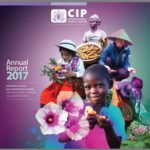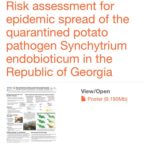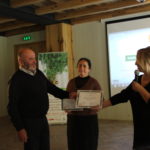About Project
The International Potato Center (CIP) has been is implementing a three-year project, “Enhancing Rural Livelihoods in Georgia: Introducing Integrated Seed Health Approaches to Local Potato Seed Systems” with Austrian Development Agency (ADA) support since July 2017.
The overall goal of the project is to improve the livelihoods of Georgian farmers by increasing profitability and sustainability of their potato crops and to increase capacity of national players in the potato seed value chain. This will be achieved by improving the quality of potato seed, benefitting small-scale potato farmers in Georgia, who will see improvements in the quality of planting material, boost their productivity and yield stability, and consequently increase theirs and their families’ income and quality of life. Increased profitability of the potato crop could also benefit consumers through lower and/or more stable prices. An improved seed system will lead to more efficient diffusion of new varieties, which has benefits to farmers and consumers that transcend productivity.
Strategy
The overall goal of the project is to improve the livelihoods of Georgian farmers by increasing profitability and sustainability of their potato crops and to increase capacity of national players in the potato seed value chain. The objective of the project is to improve the quality of potato seed of farmers in Georgia.
Outputs/Results
- A potato seed plan incorporating integrated seed health (ISH) strategies developed for Georgia.
- Weaknesses in current certified seed system identified and addressed.
- Training plan for on-farm seed management developed and integrated into the existing farmer training network.
- New varieties with resistance to viruses identified and promoted as part of the ISH strategy.
Activities
Output 1: A potato seed plan incorporating ISH strategies developed for Georgia
1.1 Conduct baseline study on potato seed system in Georgia, including a focus on the seed value chain
1.2 Use baseline survey data to map seed system with network analysis and develop seed degeneration scenarios with modeling; evaluate role of seed quality in yield gap using the Agricultural Production Systems Simulator (APSIM) model
1.3 Based on outputs from the above, develop and document national seed plan in consultation with stakeholders
1.4 Conduct end-of-project evaluation of progress toward goals.
Output 2: Weaknesses in current certified seed system identified and addressed
2.1 Identify the most appropriate disease detection technologies and protocols for Georgia context
2.2 Identify the best multiplication practices for different seed generations
2.3 Develop training materials for seed producers/multipliers
2.4 Identify the most appropriate certification standards for Georgia, assessing consistency with international UNECE Standards for seed potato
2.5 Identify best practices for field inspection adapted to proposed certification standards and assess consistency with UNECE Standards for field inspection.
Output 3: Training plan for on-farm seed management developed and integrated into the existing farmer training network
3.1 Identify best practices for on-farm management of self-saved seed in Georgian context
3.2 Develop farmer training plan with local farmer extension services
3.3 Plan and implement Training of Trainers (TOT) for the MoA–FESC .
Output 4: New virus-resistant varieties identified and promoted as part of the ISH strategy
4.1 Promote use of virus resistance in Georgian potato breeding program
4.2 Evaluate virus resistance in commercial varieties currently grown and new candidate varieties introduced by CIP.










